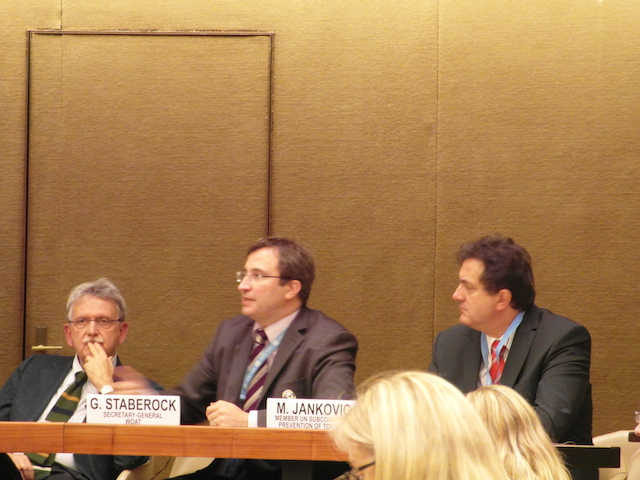"Closing the gap: setting an agenda for eradication" : remarks by the OMCT SG on the occasion of the 30th anniversary of the Convention against Torture
Press Release
OMCT calls for support to civil society as keycondition for bringing the Convention against Torture home
Geneva, 4 November 2014

Addressing the commemoration by the United Nations of the 30thanniversary of the UN Convention Against Torture the OMCT calls for increasedcivil society support as core component of an agenda to eradicate torture.
‘Theimplementation gap remains today the number one challenge in the fight againsttorture’, as Gerald Staberock, Secretary General of OMCT noted at theoutset of his remarks. ‘It is time for allof us to build a comprehensive response to torture that ensures that thoseresponsible are held accountable, and that ensure real culture change in law enforcement,security services and the judiciary’.
Gerald Staberock set out the fundamental role of civilsociety. Without a constituency for reform and organizations that can documentand report on torture free of threats, that can provide vital victim assistanceseeking justice and providing the expertise for legal and policy reforms toprevent torture it will be impossible to make progress. The emergence ofpartner organisations around the globe is the single most important element ofhope for the coming future in implementing the Convention against torture.
‘States have toensure as a baseline that working on torture is not a high-risk area’, henoted commenting on the many threats faced by members of the global SOS-TortureNetwork of the OMCT. ‘Defenders aroundthe world working on torture face threats, intimidation and harassment. We haveto pay tribute to those courageous individuals. The impediment to their workhas to stop.’
The presentation outlines key elements to make thework of the Committee against Torture more accessible, visible and having realimpact in the societies concerned.
‘We have aresponsibility to ensure that the deliberations on torture here in Genevabefore the Committee against Torture are taken seriously, made visible and knownin the countries concerned, so that the Committee’s recommendations are a real toolfor change’, he resumed.
For the full speech, please see the attached document.
Attachments
-
- image
Viewphoto